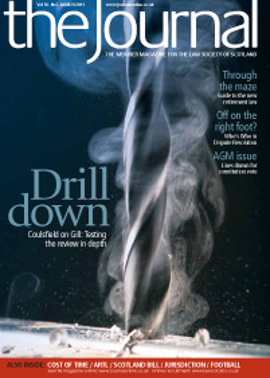Watching over the constitution

Journal readers may recall the January cover feature, highlighting the significant new tax powers proposed to be conferred on the Scottish Parliament by the Scotland Bill. However the bill is of wider interest to the Law Society of Scotland, which has made written submissions to both the Scottish and Westminster Parliaments, and gave evidence at two separate sittings of the Holyrood committee examining the bill.
Although a Westminster measure, the bill affects the current powers of the Scottish Parliament and therefore requires a legislative consent (“Sewel”) motion of that body. The specially constituted Scotland Bill Committee, chaired by Wendy Alexander MSP, has been charged with reporting on alternative consent motions, one in name of the Scottish Government and one by the opposition parties, ahead of a debate due to take place before the Parliament is dissolved for the May election.
This was the public process to which several witnesses from the Society have already contributed. In addition it has been active in the UK parliamentary process. “We have issued our usual second reading letter to all Scottish MPs and to relevant ministers across UK departments”, says Michael Clancy, Director of Law Reform. “We have also framed a number of amendments following on a memorandum we also sent to the Scottish Affairs Committee of the House of Commons, similar to the one sent to the Scottish Parliament Committee. All that is reinforced with discussions with MPs and MSPs who have an interest in these matters.”
Competence in the open
While highly political, the bill is an important constitutional measure and it is that aspect in which the Society takes a particular interest, along with the practical implications of devolving, or in some cases re-reserving, particular powers. Thus for example it has highlighted potential difficulties and anomalies in the proposed definition of a Scottish taxpayer; and welcomed the re-reserving of aspects of insolvency law as liable to improve the efficiency of the corporate insolvency process.
“Our intention always in dealing with law reform matters, whether of constitutional importance or not, is to put forward proposed changes which will improve, clarify and make more consistent the measure in front of the legislature”, Clancy comments. “So I wouldn’t talk in terms of support for the bill. There are certain aspects which clarify existing law, but there are also elements which would require some clarification themselves. It’s with that intention that we seek to influence the parliamentary process.”
One provision the Society supports, and indeed would like to see strengthened, is clause 6, which would require a more detailed statement from the minister or other proposer about the legislative competence of a bill. Christine O’Neill of Brodies, convener of the Society’s Constitutional Law Committee, believes the legislative process would benefit. “The Society’s position is that statements of legislative competence should be more than mere formula and that it would be helpful if statements gave the public and Parliament more information about why it is thought that a bill is within legislative competence”, she says.
Some fear that providing reasons would only encourage litigation to challenge those reasons. But although certain high-profile enactments, such as the ban on hunting with dogs, the rights conferred on those suffering from pleural plaques, and the controls on the sale of tobacco products, have been tested in the courts, by far the greater amount of devolution issue litigation has tested the conduct of ministers rather than that of Parliament. “Statements of legislative competence are a matter of public interest, they are there to serve the public, and if there is a question about legislative competence, that is something that ought to be open and transparent and debated before a bill becomes an Act”, O’Neill says.
Devolution issues redefined?
For “ministers” one can in most cases read “Lord Advocate”. It was the number of devolution issues raised in relation to individual prosecutions that led to the Advocate General for Scotland, Lord Wallace of Tankerness QC, setting up an expert group under former European Court judge Sir David Edward QC to consider whether any restriction on the current provisions was necessary or desirable. The group’s report, which recommends in effect that while human rights challenges concerning the Lord Advocate’s prosecution functions should still come within the jurisdiction of the UK Supreme Court, a successful challenge would no longer automatically render a prosecution null and void, was only published after the Holyrood committee hearings began. The Society, which argued before the expert group that the status quo should continue, has at time of writing yet to take a view on its conclusions, or indeed to have sight of the draft additional clauses to the bill that would implement them.
Lord Advocate Elish Angiolini QC attracted media headlines when, also giving evidence to the committee, she suggested that the separate identity of Scots law might be under threat from the Supreme Court’s activities – a view quoted by Justice Secretary Kenny MacAskill in his most recent statement to the Parliament on the fallout from the Cadder decision. Clancy and O’Neill assert their faith in the robustness of Scottish jurisprudence, while agreeing that the identity of Scots law must be defended. “Sometimes case law and legislative change can provide those appropriate course directions and redirections which will make sure that we maintain its identity”, Clancy comments. Pointing to the example of Donoghue v Stevenson, which overturned Court of Session decisions that a consumer of goods did not have a right of action against the manufacturer, he adds: “The identity of Scots law was not changed by the House of Lords, but the detail was certainly changed.” The Society’s proposal for a human rights audit and consolidation of Scots law as contained in the manifesto would help maintain Scots law’s identity.
“There is a perspective that one ought not to be looking at the Supreme Court as alien but as a valuable part of the Scottish legal system”, O’Neill observes – “as indeed are the Strasbourg and Luxembourg courts”.
Searching questions
Headline issues aside, the Society’s fine toothcomb has picked up other points on which to question the (UK) Government’s intentions. One is the provisions that would repeal the Convention Rights Proceedings (Amendment) (Scotland) Act 2009, which ended the anomaly of the lack of time bar for actions under the Scotland Act based on breaches of Convention rights, revoke the special consent order enabling the Scottish Parliament to pass the Act, and re-enact the time bar as part of the Scotland Bill. Why is that thought necessary, Clancy asks? Is it only a tidying up measure? Does it mean there is some flaw in the 2009 Act? Or does the UK Government want to re-establish legislative power over time limits so that a future Scottish Parliament could not alter the time limit? “Whatever the answer is, the explanatory notes do not provide much in the way of explanation and an amendment we have put forward to delete clause 16 is essentially a probing amendment to ascertain what the Government’s intention was in bringing forward such change.”
He concludes by encouraging solicitors to acquaint themselves with the significant changes taking place. “The bill is only one of a number of constitutional changes going through the UK Parliament at this moment, along with fixed-term parliaments legislation and changes to the voting system and constituencies. All these add up to substantial constitutional change, and with the prospect that there might also be change to the human rights tableau in the future, we should all be aware of what is going on. We encourage people to consider what thoughts they might have on them, and if they have points to raise about any of these bills, get in touch with us.”
In this issue
- The case for full disclosure of laboratory case files
- Why join the Scottish Family Law Association?
- Above board
- Time to be counted
- Taking out rejections
- Updating the constitution
- Every bit helps
- Retiring the default age
- Keeping a grip on cash
- Watch this space
- The diehards
- Win-win ways
- "Virtual fair" opens for career options
- Law reform update
- Society's in-house work under scrutiny
- Watching over the constitution
- All aboard life's U-bend
- Ask Ash
- Working to advantage
- Frauds and scams beware
- Lay help... official
- Lacuna manufacturing
- This time it's NOT personal
- Fairness and trust
- Pensions: redefining value
- Sharing the spoils
- World IP Day 2011 approaches
- Life v reputation
- Book reviews
- ARTL, by degrees
- Contaminated land - the story continues






